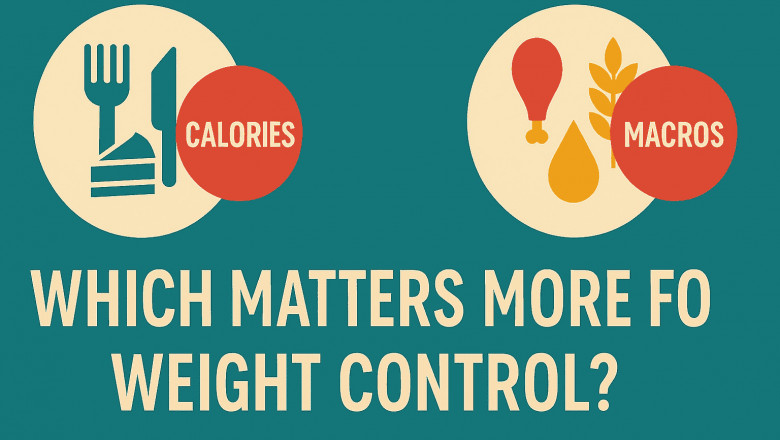views
Calories vs. Macros: Which Matters More for Weight Control?
When it comes to weight control, one of the biggest debates in the fitness and nutrition world is whether calories or macronutrients (macros) matter more. While some believe that "calories in vs. calories out" is the only thing that dictates weight loss or gain, others argue that the composition of those calories is crucial. In this article, we’ll break down the importance of both calories and macros to help you find the best approach for managing your weight. If you're looking for expert advice, consulting the Best Weight Management Dietician in Noida can help you create a personalized plan.
Understanding Calories and Macros
What Are Calories?
Calories are units of energy that our bodies obtain from food and use for daily activities, bodily functions, and exercise. The concept of weight loss or gain is often simplified to:
Calories In vs. Calories Out (CICO): If you consume more calories than you burn, you gain weight. If you burn more than you consume, you lose weight. While this principle holds, the source of those calories plays a vital role in overall health and body composition.
What Are Macros?
Macronutrients (macros) are the three main nutrients that provide calories and play different roles in the body:
-
Carbohydrates: The body’s primary energy source (4 calories per gram). Found in foods like rice, bread, fruits, and vegetables.
-
Proteins: Essential for muscle repair, growth, and overall body function (4 calories per gram). Found in meat, fish, dairy, and legumes.
-
Fats: Crucial for hormone production, brain function, and energy storage (9 calories per gram). Found in nuts, oils, and avocados.
Calories vs. Macros: Which Matters More?
The Argument for Calories
The calorie balance equation is fundamental to weight management. Research shows that as long as someone is in a caloric deficit (burning more than consuming), they will lose weight, regardless of macronutrient composition. However, focusing solely on calories has its downsides:
-
Ignoring Nutritional Quality: A 1500-calorie diet consisting of junk food vs. whole foods will have different effects on metabolism, satiety, and energy levels.
-
Hunger and Satiety Issues: Not all calories are equal in their ability to keep you full. High-protein and high-fiber foods improve satiety, reducing overall calorie intake naturally.
-
Metabolic Effects: Ultra-processed foods can affect hormones and lead to inflammation, making weight management harder even in a caloric deficit.
The Argument for Macros
Macros determine how your body processes food, builds muscle, and stores fat. Even if calorie intake is controlled, an imbalance in macronutrients can lead to:
-
Muscle Loss: A low-protein diet in a caloric deficit can lead to muscle breakdown instead of fat loss.
-
Hormonal Imbalances: Fats are essential for hormones like testosterone and estrogen, which affect metabolism.
-
Energy Fluctuations: A diet too low in carbs can cause fatigue, while excess carbs without proper control can lead to insulin resistance.
A balance of macros ensures better body composition, sustained energy levels, and improved overall health. This is why a Best Weight Management Dietician in Noida can help tailor the right macro ratio based on individual needs.
How to Find the Right Balance?
1. Set Your Caloric Target
To maintain, lose, or gain weight, determine your Total Daily Energy Expenditure (TDEE). Many online calculators can help you estimate your calorie needs based on age, activity level, and goals.
2. Choose the Right Macro Breakdown
A general guideline for macros based on different goals:
-
Fat Loss: 40% protein, 40% carbs, 20% fats
-
Muscle Gain: 30% protein, 50% carbs, 20% fats
-
Maintenance: 30% protein, 40% carbs, 30% fats
3. Prioritize Nutrient-Dense Foods
Whole, unprocessed foods provide better nutrient absorption, digestion, and satiety. Focus on:
-
Lean proteins (chicken, fish, tofu)
-
Complex carbs (quinoa, oats, vegetables)
-
Healthy fats (avocados, nuts, olive oil)
4. Monitor Progress & Adjust
Tracking both calories and macros helps fine-tune your approach. If weight loss stalls despite a calorie deficit, adjusting macros (e.g., increasing protein) can help.
Final Verdict: Calories or Macros?
Both calories and macros play crucial roles in weight management. While calories determine overall weight change, macronutrients influence body composition, energy levels, and health. The ideal approach combines caloric control with a strategic macronutrient ratio tailored to your goals. For a personalized plan, seeking advice from the Best Weight Management Dietician in Noida, Dr. Namita Nadar ensures optimal results.






















Comments
0 comment